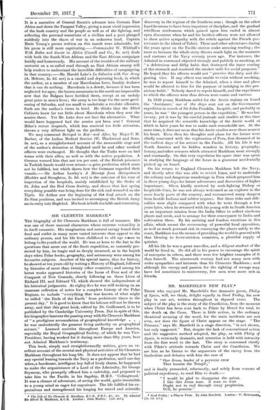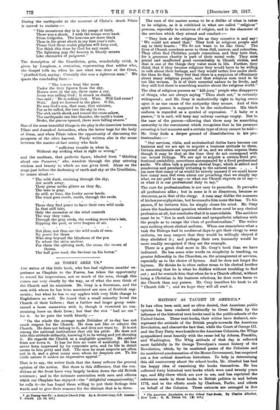MR. MASEFIELD'S NEW PLAY.* Those who enjoyed Mr. Mosefield's fine
dramatic poem, Philip of Spain, will, we think, delight equally in Good Friday, his now play in one act, written throughout in rhymed verse. The subject of the play is the story of the Crucifixion, from the moment when Christ has been sent back to Pilate by Herod for trial, to the death on the Cross. There is little action, in the ordinary theatrical meaning of the word, for the main incidents aces not seen, nor does the figure of Christ appear on the stage. "The Prisoner," says Mr. Mosefield in a stage direction, "is not shown, but only suggested." But, despite the lack of conventional action and the suggestive method adopted, the play, as with Philip of Spain, is extremely dramatic, and attention is held wills intensity from the first word to the last. The story is concerned chiefly with Pilate's attitude towards Christ and the Crucifixion. We see him as he listens to the arguments of the envoy from the Sanhedrim and debates with him the case of "One Jesus, leader of a perverse crow That haunts the Temple," and is finally persuaded, reluctantly, and solely from reasons of political expediency, to rend Him to death :— "I would be glad to disappoint the priest.
I like this Jesus man. A man no wise Ought not to end through crazy prophecies. Still, he persists"
• Good Friday ; a Play is Verse. Hy John liaseneld. London: NV. Uelnemana, Oa. td. net.]
During the earthquake at the moment of Christ's death Pilate is moved to exclaim :— "This monstrous day is in the pangs of birth.
There was a shook. I wish the troops were back From Golgotha. The heavens are more black Than in the great shock in my first year's rule. Please God these zealot pilgrims will keep cool, Nor think this done by God for any cause.
The lightning jags the heaven in bloody seams Like chronicles of judgment."
The description of the Crucifixion, grim, wonderfully vivid, is given by Longinus, a centurion, representing that soldier who, the Gospel tolls us, when he saw what was done at the Cross, "glorified God, saying: Certainly this was a righteous man." We quote the concluding lines :— " The towers bent like moss Under the fiery figures from the sky.
Horses wore in the air, there came a cry.
Jesus was calling God ; it struck us dumb.
One said 'He is calling God. Wait. Will God come?
Wait.' And we listened in the glare. 0 Sir, He was God's son, that man, that minister,
For as he called, fire tore the sky in two, The sick earth shook and tossed the cross askew, The earthquake can like thunder, the earth's bones Broke, the graves, opened, there were falling stones."
One of the most beautiful things in the play is the interview between Pilate and Joseph of Arimathea, when the latter begs for the body of Jesus, and when Pilate takes the opportunity of discussing the prospects of the olive harvest. Finely written also is the scene between the matter-of-fact Bantry who finds
"sufficient trouble in what is,
Without my seeking what is right or wrong," and the madman, that pathetio figure, blinded from "thinking aloud one Passover," who wanders through the play uttering wisdom and beauty to which no one gives heed. Alone on the Edna just before the darkening of earth and sky at the Crucifixion, he muses aloud :— " The wild duck, straining through the sky, Are south away.
Their green necks glitter as they fly, The lake is gray.
SO sin, so lone, the fowler never heeds.
The wind goes rustle, rustle, through the reeds. • There they find peace to have their own wild souls In that still lake, Only the moonrise or the wind controls The way they take, Through the gray reeds, the cocking moor.hen's lair, Rippling the pool, or over leagues of air. • Not thus, not thus are the wild souls of men.
No peace for those Who step beyond the blindness of the pen To where the skies unclose.
For them the spitting mob, the cross, the crown of
thorns, The bull gone mad, the Saviour on his horns."



























 Previous page
Previous page